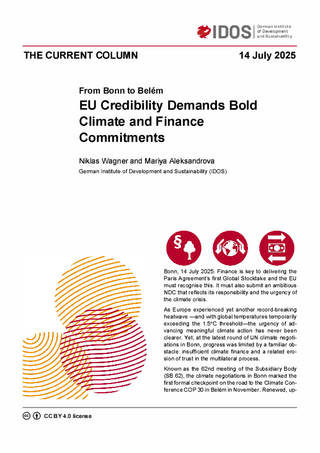From Bonn to Belém
EU Credibility Demands Bold Climate and Finance Commitments
Wagner, Niklas / Mariya AleksandrovaThe Current Column (2025)
Bonn: German Institute of Development and Sustainability (IDOS), The Current Column of 14 July 2025
Bonn, 14 July 2025. Finance is key to delivering the Paris Agreement’s first Global Stocktake and the EU must recognise this. It must also submit an ambitious NDC that reflects its responsibility and the urgency of the climate crisis.
As Europe experienced yet another record-breaking heatwave —and with global temperatures temporarily exceeding the 1.5°C threshold—the urgency of advancing meaningful climate action has never been clearer. Yet, at the latest round of UN climate negotiations in Bonn, progress was limited by a familiar obstacle: insufficient climate finance and a related erosion of trust in the multilateral process.
Known as the 62nd meeting of the Subsidiary Body (SB 62), the climate negotiations in Bonn marked the first formal checkpoint on the road to the Climate Conference COP 30 in Belém in November. Renewed, updated, and ambitious Nationally Determined Contributions (NDCs) – targeting 2035 - are set to be a central focus of COP30, as countries are expected to align their climate commitments with the goals of the Paris Agreement. However, rather than momentum, the two weeks of SB62 negotiations reflected the system’s deep malaise. Lingering frustration over the climate finance goal adopted last November at the climate conference in Baku was noticeable during the two weeks of negotiations across different negotiation items. While the SBs have traditionally advanced technical negotiations to prepare the ground for political decision-making at COPs, this time even technical work was increasingly paralysed by unresolved questions around finance. Nowhere was this more evident than in discussions on the Global Goal on Adaptation (GGA), where progress on an indicator framework for measuring needs and progress risks becoming performative in the absence of financial backing. Without concrete commitments, many developing countries view technical outcomes as symbolic rather than actionable.
Brazil, as the incoming COP30 Presidency, has stated its ambition to use the summit in Belém as a platform for renewed climate leadership. With the United States withdrawing from the Paris Agreement—and thereby stepping back from key climate negotiations— the pressure is mounting on the EU to lead on climate policy ambition and climate finance. However, developments over the past two weeks have dealt a significant blow to Europe’s leadership. As the European Commission proposed a 2040 target of a 90% net reduction in greenhouse gas emissions from 1990 levels to meet international climate commitments, it faced criticism for relying on carbon markets and offsetting schemes that risk outsourcing responsibility and delaying domestic transition. Just days later, the European Parliament—backed by right-wing parties and the European People’s Party—rejected a push to fast-track talks on the proposal. Now, the far-right Patriots of Europe - opponents of climate action, are set to lead negotiations on a goal they generally oppose. The EU’s climate credibility in Belém—including its preparation of a timely and ambitious NDC—is in jeopardy.
Europe must act without delay and reinforce its credibility as a leading global actor - especially at a time when the UN climate regime faces mounting challenges and climate finance is increasingly reshaping global power dynamics - the EU should respond proactively. First, Europe must deliver an ambitious new NDC that reflects the EU’s historical responsibility, incorporates enforceable domestic policies instead of international carbon credits, and takes into account the outcome of the first Global Stocktake (GST) concluded in 2023 in Dubai. As the first comprehensive assessment of collective progress under the Paris Agreement, the GST confirmed the widely recognised reality that current efforts fall short of meeting both temperature and resilience goals. It calls for tripling renewable energy, doubling energy efficiency, phasing down unabated coal, and—significantly—marks the first UN climate decision to urge a transition away from fossil fuels. It also highlights the urgent need to accelerate adaptation efforts.
Second, the EU must demonstrate flexibility in engaging constructively on climate finance as a cross-cutting issue across multiple negotiation streams at COP 30 and beyond. For many countries from the Global South, the contrast between rising military budgets in Europe and the US and the persistent failure to provide adequate climate finance felt not only hypocritical, but also as a failure of industrialised countries to comply with their legal obligations of the Paris Agreement.
COP 30 is a pivotal moment to restore trust in the Paris Agreement and the EU and Germany must not miss it. Germany should play a proactive role in ensuring a bold EU NDC framework and robust climate finance, not only to enable ambitious climate action, but also to drive technical progress and strengthen multilateralism. The EU and Germany must treat climate leadership as both a geopolitical responsibility and a strategic imperative. Belém must become a turning point.



